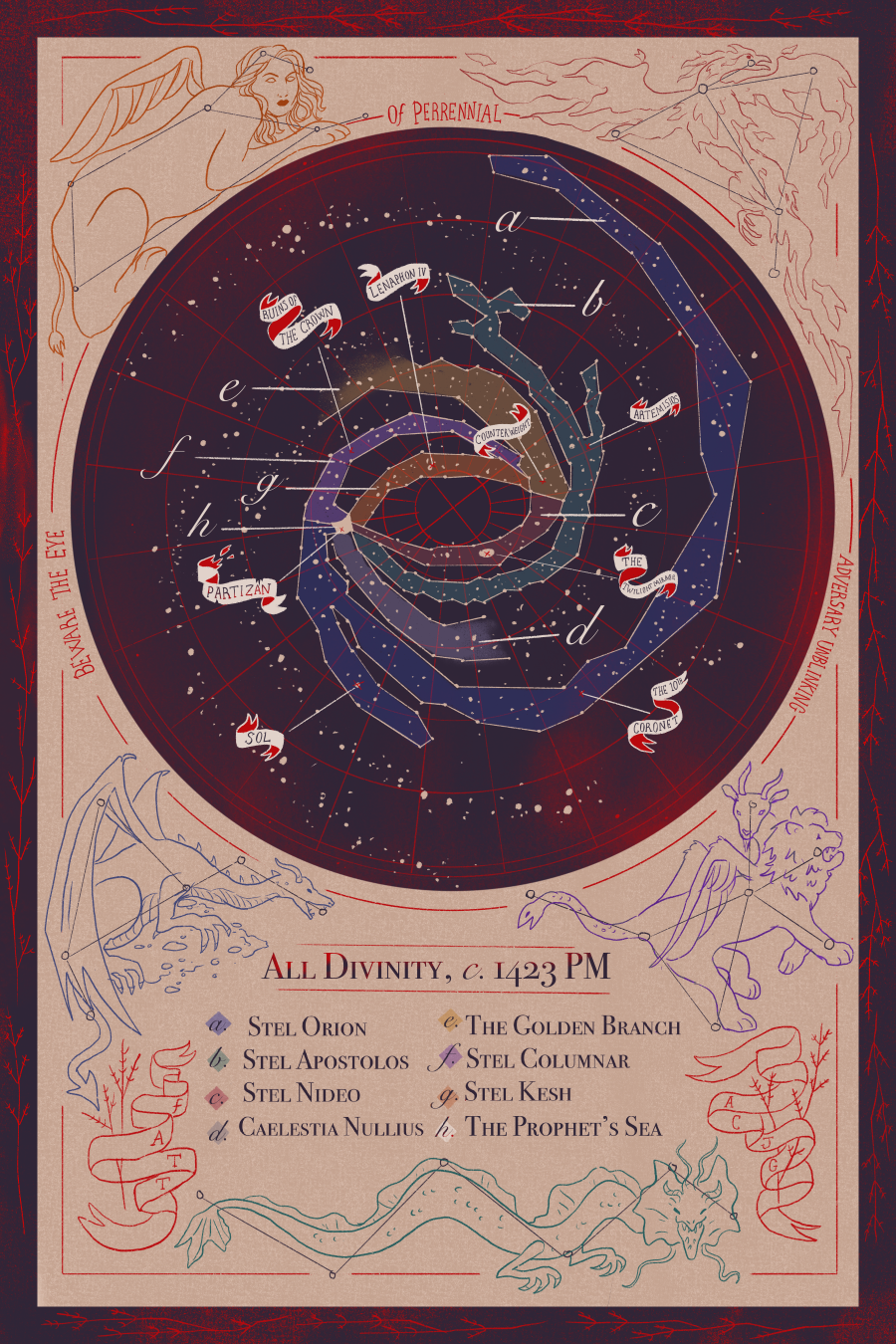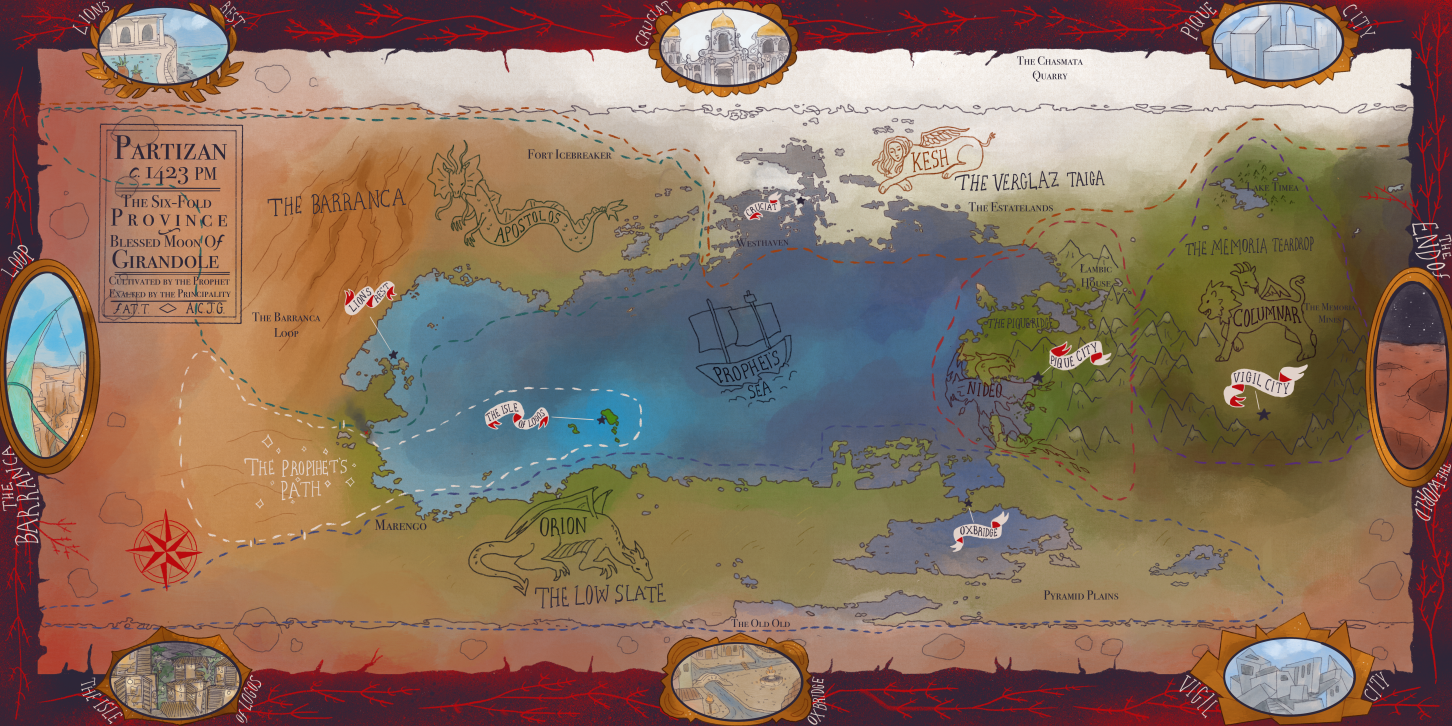m (1 revision imported) |
m (Fixed broken image.) Tag: 2017 source edit |
||
| Line 24: | Line 24: | ||
<strong>This week on PARTIZAN: The Divine Principality</strong> | <strong>This week on PARTIZAN: The Divine Principality</strong> | ||
[[File: | [[File:Galaxy map-small.png|thumb|400px]] | ||
[[File: | [[File:Partizan map-small.png|thumb|400px]] | ||
'''The Divine Principality''' is a massive space empire led by a '''Princept''' and comprised of five major houses, called Stels. While the Principality is in a state of constant war with '''[[The Branched]]''', a rival power extremely far from the small moon of Partizan, these Stels are also in various states of conflict (open and hidden) with each other. In brief, those Stels are: | '''The Divine Principality''' is a massive space empire led by a '''Princept''' and comprised of five major houses, called Stels. While the Principality is in a state of constant war with '''[[The Branched]]''', a rival power extremely far from the small moon of Partizan, these Stels are also in various states of conflict (open and hidden) with each other. In brief, those Stels are: | ||
Revision as of 04:16, 13 July 2022
Template:PARTIZAN Episode Infobox
Episode Description
It is the year 1423 of the Perfect Millennium, and the galaxy has been conquered by the Divine Principality. At the center of this empire, the only place where its five Great Stels meet, there is a moon beating where a heart should be. The moon of Partizan.
Abetted by immortal, machinic gods called Divines, and the legions of Hallowed mechs which extend their terrible reach, the Principality spent millennia sharpening itself on its rivals. What it could not devour it obliterated. What it could not obliterate, it simply outlived. It was an empire, unshakeable.
Until now.
For the first time in the Principality’s long history, two of its five Stels have gone to war with one another, each guided by a ruler with sound claim to the title of Princept, leader of All Divinity. For five years, they have fought to a standstill, while equivacators and scavengers find profit in rubble.
But historical crises do not only serve crass opportunists, they revive opportunity itself. Under the shadow of this war you find yourself wondering: For how long will there be empires? For as long as we breathe? Longer? Will the categories of our conquest outlast us, or could there come a day for something else.
We once dreamt that breaking free from our ancient home in the cosmos would allow us to escape the mass and pull of tyranny and trauma. We failed then, but perennial chaos offers us another chance: Can we launch with such speed that we glide, graceful or imperfect, beyond war and pain? Or is the truth more damning that: Might we carry our own gravity with us?
This week on PARTIZAN: The Divine Principality
The Divine Principality is a massive space empire led by a Princept and comprised of five major houses, called Stels. While the Principality is in a state of constant war with The Branched, a rival power extremely far from the small moon of Partizan, these Stels are also in various states of conflict (open and hidden) with each other. In brief, those Stels are:
Stel Kesh: The oldest established power in the galaxy, built around a stuffy (and secretive) aristocracy. They are tied to the Past. History, knowledge, stubbornness.
Stel Nideo: Created the largest faith in the empire, and used that influence to shape (and surveil) mass culture. They are tied to the Present. Faith, coercion, stability.
Stel Orion: An industrial giant that controls more literal space than any other Stel, yet is also the most fragmented and unstable. They are tied to Space. Wealth, labor, expansion.
Stel Columnar: A fence-sitting democracy, made up largely of synthetics on the cutting edge of technology, art, politics, and war. They are tied to the Future. Innovation, style, cowardice.
Stel Apostolos: A dynamic and diverse military powerhouse, guided by an iconic, but controversial leader. They are tied to Motion. Speed, change, violence.
There are two major faiths in the Principality. Both espouse the idea of an empire built of minor states--allowing for small scale conflict without threat to the whole empire. Where they differ is:
Received Asterism: Teaches that Divines, the immortal machines and mechs that helped establish the Principality's hold on the galaxy, reflect the best aspects of the state itself. The divine Strength, in other words, is like a living flag of the Principality's own strength.
Progressive Asterism: Teaches that these same Divines are true embodiments of their names, and that the citizens and states of the Principality should look to them as guiding stars. The Divine Strength, in other words, is a reflection of strength itself, or maybe "god's strength," and we should aspire to make our strength look like the divine's.
5 years ago, Dahlia, the living Princept (born to Kesh, then kidnapped by Nideo, then rescued and raised into adulthood by Apostolos), declared themself leader of both Stel Kesh and Apostolos alongside a stunning revelation of the Principality’s crimes against Apostolos. Kesh called these claims an Apostolosian ploy for power, and elected a minor noble as an anti-Princept.
Today, as Apostolos and Kesh war openly over territory, authority, and public sentiment, the other Stels seek to capitalize on the chaos. Columnar and Orion’s long cold war, driven by each Stel’s desire to cement its status as dominant economic and technological power, needs only a single spark to explode. Still repairing their reputation after the Farmer’s Sin, Stel Nideo bides their time, rebuilds their forces, and gains popular support. Soon, a weakness will be revealed, and they will be prepared.
Plot
Cast
- Austin Walker
- Janine Hawkins (Thisbe)
- Sylvia Clare (Ver'million Blue)
- Ali Acampora (Kal'mera Broun)
- Art Martinez-Tebbel (Soverign Immunity)
- Jack de Quidt (Clementine Kesh)
- Keith J Carberry (Exeter Leap)
- Andrew Lee Swan (Valence)
Other Character
- Dahlia (mentioned)
New Music
- TANAGER. PERFECT. TOUCHPAPER., opening.

